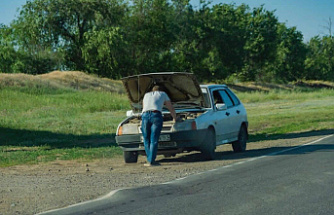The prelude to ARD-Sunday evening crime season 2018/19 comes once again from Switzerland and it is for a change: furious. This can rarely be said about Swiss crime scene episodes and has at music Die Last (SRF Editor: Maya Fahrni) to do with form that director Dani Levy (Derzusammen with Stefan Brunner and Lorenz Lady also responsible for screenplay) has chosen.
The result was shot in a setting, i.e. real time or better: like a play. Levy himself mentions in PresseheftSebastian Schippers film Victoria as a suggestion that 2015 a young woman accompanied by a Berlin night. The music dies last plays Währendeines benefit concert in elegant, Jean Nouvel-designed culture-UndKongresszentrum Luzern (KKL), which is stagedurchmessen like a atre on and off.
The concert was organized by wealthy entrepreneur Walter Loving, works of Jewish composers who survived Holocaustnicht played by Jewish Chamber Orchestra Munich. In DasRund of music, film has planted an actor as a conductor (Gottfried Breitfuss) and Teresa Harder (as pianist Miriam Goldstein) UndPatrick Elias (as violinist Daniel Goldstein).
The siblings plans a scandal because it wants to illuminate Lovings ZwielichtigeRolle during Nazi period: loving (played by Hans Hollmann, who is of course too young from his actual age fürseine figure) was a so-called intermediary, he organized, Könnteman say, Jewish families, escape. He founded his fortune, Könnteman also say, on business with plight of or people.
Matthias Dell has been writing about "Tatort" and "Polizeiruf 110" Every week since 2010. On time online since 2016 in column "The autopsy report". (copyright) Daniel SeiffertThe way to final coup (Miriam Goldstein wants to announce öffentlichLovings past as recitative) are lining up poisoning, scene of crime, occasion for Ermittlungstiften. What is striking is how late Kommissarduo is intervening – Wasschön shows, and that would be an unconditional advantage of Levy's form, Wieschematisch and Krimifern early murder and Kommissarinnenpräsenz imstandard crime scene.
That Liz Ritschard (Delia Mayer) is one of Konzertbesucherngehört (Stefan Gubsers Flückiger is Dazugerufen by a football game), quickly y an indication of constraints that shooting brings with no cut. If camera is running permanently, everything that is supposed to play before it must already be re. Every walk away from protagonists includes Überlegungein, as can be found back to.
In order to gain a little freedom and not to hang all time with Walter Loving and his two wives (Sibylle Canonica AlsNoch-wife, Uygar Tamer as an ominous loving-employee and lover), music invents a metacharacter at last. The Diabolical loving son Franky (AndriSchenardi) is involved in action on one hand, but works primarily as a kind of ceremonies within strict one-take form.
He speaks directly and himself referential in camera ("Don't be afraid, story goes on immediately; I had only commissioned orders, way from ladies ' toilet to Sea-bar "), EineFigur, which reflects on film in which it Coacts (" ridiculous, alone refore I do not like detective stories: instead of showing or saying, at Wemsie have found poison, makes Directing one to Suspense ").
Date Of Update: 06 August 2018, 12:00











